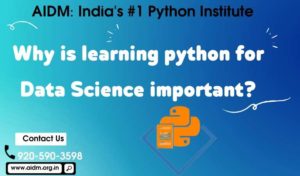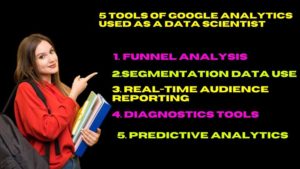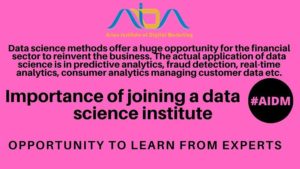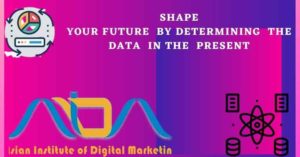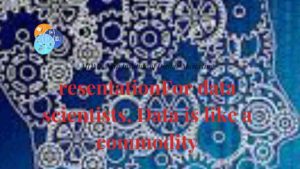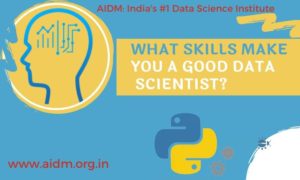Post Contents
Here in this post, AIDM is presenting the use of GPU’s in the data science industry and why all the data scientists love this. Being a leading Data Science Institute in Delhi we have come up with the information about how GPUs impact on a data scientist’s efficiency.
What Are GPUs?
GPU data processing or graphics processing units are commonly used in the gaming industry, it has wide application in the accelerated data science industry also. They help in fast rendering and processing of computers which make to represent data more effectively with the use of graphics.
While GPUs were intended to deliver graphics through fast numerical estimations, it is this superior preparation that makes them engaging for accelerated data science. It empowers AI to gain from pictures and sounds, utilizing gigantic measures of picture and sound contributions for these deep learning processes.
To make this a reality, GPUs power neural organizations being prepared at scale so end-clients can appreciate the picture, video, and voice-based applications just as the proposal motors so a considerable lot of us use, regardless of whether it is to locate a decent restaurant or our new most loved shoes.
It will be good if you learn python course in delhi yourself by joining the Django training in delhi
Impact of GPUs in data science?
We all know about the requirement for good handling power to complete our work. That applies to our laptops and desktop PCs just as bigger infrastructure, for example, servers, switches, and, of course, the organization we as a whole depend on.
The term CPU, focal handling unit, is ordinary and portrays the primary processor inside a PC, the “brain” of the machine that executes instructions and projects.
GPU vs CPU data science
In accelerated data science, Python libraries have gotten progressively effective at using the current CPU power accessible. At the point when you need to work with many millions or even billions of records, running deep learning applications, in any case, CPUs won’t be adequate.
GPUs and the power they bring to Data Science opens up new opportunities for data researchers, investigation offices, and the association in general.
Central processors measure successively, while GPUs measure in parallel. So even a huge group of CPUs can’t accomplish similar execution as the correct architecture of GPUs for preparing deep learning calculations.
GPU for data analytics
In the period of developing Artificial Intelligence (AI), machine learning, and large data, fusing the figuring power of GPUs is imperative for preparing and removing bits of knowledge from gigantic datasets with lightning pace and precision. Enormous data examination use cases can include up to several billions of records inside a solitary table, often ingesting data at a huge number of records a second, most of which contain Spatio-fleeting data. These attributes speak to a tremendous test for heritage frameworks, which can’t scale without GPUs.
Numerous enormous data investigation clients are receiving the idea of a data lake architecture, holding immense measures of crude data in its local arrangement until it is required – GPU for data analytics offer the help needed to deliver such high-cardinality data with zero latency, an imperative component for such use cases as self-governing vehicles and debacle reaction. A few highlights of GPU for data analytics examination include:
Server-Side Data Rendering: in-situ rendering of on-GPU question results to quicken the visual rendering of grain-level data
Vast Rendering of Points and Polygons: A GIS examination arrangement that empowers zero-latency point map representation of a huge number of lines or polygons on a geo-outline
Representation with APIs: an adjustable perception framework that consolidates the nimbleness of a lightweight frontend with the parallel power and rendering capacities of a GPU motor
Ultra advance Memory Management and GPU Caching: render inquiry results legitimately on the GPU, eliminating the slowdowns because of organization and GPU-to-CPU transfers
What Are the Opportunities for GPUs in Data Science and Analytics?
GPUs are instrumental for data researchers working with enormous data volumes on creating, preparing, and refining their models. They give a more cost-effective alternative for stacking and manipulating data at this scale than CPUs and accordingly accomplish the double advantage of decreased infrastructure costs joined with improved execution.
Given the demand for data researchers in the market and the worth associations should put on their aptitudes, GPUs give incredible opportunities to empowering data researchers to invest more energy zeroing in on esteem included errands and experience fewer frustrations stemming from slow-performing frameworks and instruments.
Join our online & offline java training institute in delhi and android app development course for beginners to become an expert in this field.
What Is GPU-Accelerated Analytics?
GPU-Accelerated Analytics alludes to a developing cluster of applications that require the major capacities of GPUs so as to effectively handle enormous data and convey a unique intuitive analytics experience.
GPU-Accelerated Analytics processing basically works by doling out register escalated bits of an application to the GPU, giving a supercomputing level of parallelism that sidesteps costly, low-level operations utilized by standard, analytics frameworks.
Where customary architectures utilizing CPUs include a critical equipment impression and require data researchers to perform downsampling, ordering, and pre-collecting, GPU-accelerated analytics (GPU Analytics) ingests whole datasets into the framework, empowering clients to right away intelligently question, envision, and power data science work processes more than billions of records.
These are the common answers and the reasons due to which all data scientists love GPUs. If you are interested enough in data science, you can join our data science course in Delhi to become an expert in this industry.
Recommended Blog:

- Shape Your Future By Determining The Data In The Present
- 10 Reasons to learn python language
- learn next level of machine learning and python language from basic to advance
- Which features make Django Framework a worth learning technology?
- Learn Next Level of Machine Learning language From Zero to Hero
- 7 Reasons, Why Python Language Become The Best Choice For Startups?


